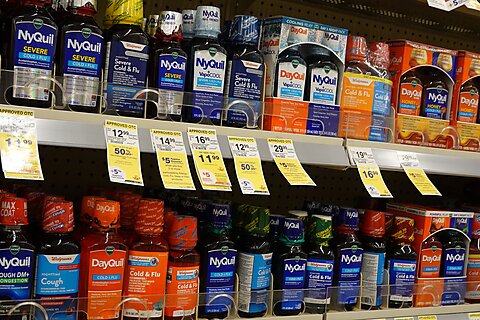On September 12, a Food and Drug Administration advisory panel reported that oral phenylephrine hydrochloride, an ingredient in many popular over‐the‐counter decongestants people purchase to treat common cold symptoms, does not reduce nasal congestion.
Phenylephrine, a drug that causes small blood vessels to constrict, is an ingredient in numerous cold remedies, including Nyquil Sinex Nighttime Relief and Sudafed PE. The FDA and drug makers believed that constricting blood vessels that supply mucus glands in the nasal passages and sinuses would cause a drop in mucus production. However, new research shows that oral phenylephrine is no more effective than a placebo.
Because FDA drug approval means that the agency determines a drug is both safe and effective, the agency might next order all of these popular brands pulled off the shelves.
The FDA first approved phenylephrine as a safe and effective over‐the‐counter decongestant in the 1970s. In 2007, an advisory panel told the FDA that evidence oral phenylephrine worked was “murky” and “not definitive” and recommended further study.
It is reasonable to ask why it has taken the FDA—an agency that controls what drugs doctors can recommend to their patients and what medications people may take to self-medicate—roughly 50 years to figure out that a drug it declared effective is not.
As Michael Cannon and I wrote in “Drug Reformation”:
Government‐imposed prescription requirements violate the rights of individuals to access the medicines they want. Vesting this power in government has left Americans with less access to medicines overall—even relative to consumers in other nations where governments also impose prescription requirements. It imposes unnecessary costs that rise during public health crises such as the COVID-19 pandemic. Evidence also suggests that government‐imposed prescription requirements make patients less safe, not more.
The answer might have something to do with the fact that Congress passed the Combat Methamphetamine Epidemic Act in 2005, which went into effect in March 2006. Designed to prevent the diversion of an effective decongestant, pseudoephedrine, into the black market where meth lab “cooks” converted it into methamphetamine, the Drug Enforcement Administration ordered all oral pseudoephedrine medications to be “behind the counter.”
Pharmacists must record the personal identification of patients wishing to purchase it. The DEA places strict limits on the dose and number of pseudoephedrine‐containing products patients may obtain within a 30‐day time frame. Oregon and Mississippi lawmakers went even further. Those states required patients to get a doctor’s prescription to purchase oral pseudoephedrine. Both states repealed those prescription requirements in 2022.
Sudafed, a popular and effective brand of pseudoephedrine decongestant, was moved “behind the counter” under the new law. People can purchase Sudafed PE over the counter without restrictions. Sudafed PE substitutes phenylephrine for pseudoephedrine (thus the “PE”).
Of course, the restrictions and inconveniences the DEA imposed on patients did nothing to combat the “methamphetamine epidemic.” It didn’t take long for the drug cartels to figure out other ingredients that could be used to make methamphetamine more efficiently (anybody who has watched the award‐winning television series “Breaking Bad” knows this).
One such ingredient is phenyl‐2‐propanone, also called phenylacetone or P2P. As a result, meth‐related drug deaths per 100,000 increased nationally by 1,500 percent between 2006 and 2021. The iron law of prohibition — “the harder the law enforcement, the harder the drug” — struck again.
Two agencies, the FDA and the DEA, combined to make millions of people with colds, allergies, and other causes of severe congestion waste their money on placebos and go without relief for decades while driving the drug cartels to discover more effective ways to make more potent forms of meth, which helped to cause meth‐related deaths to skyrocket.
Sometimes, irony can be tragic.




